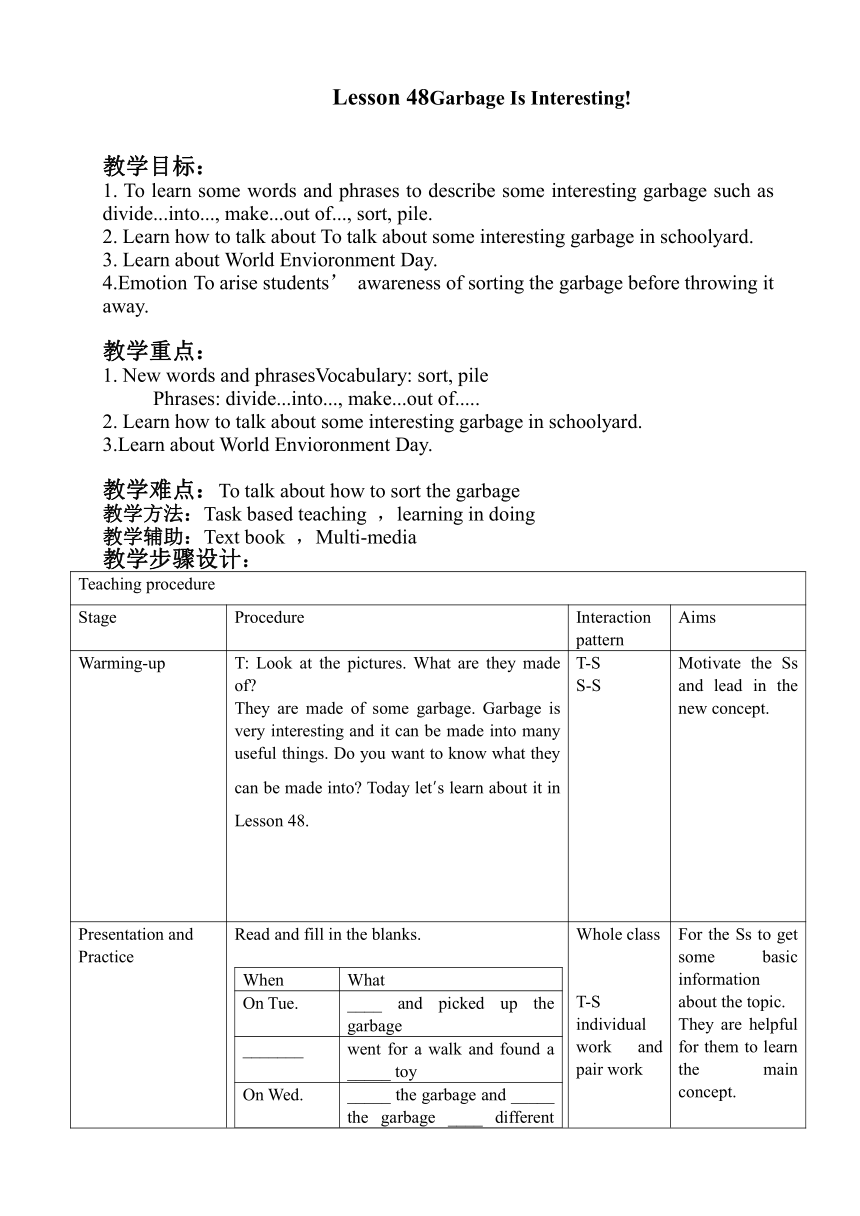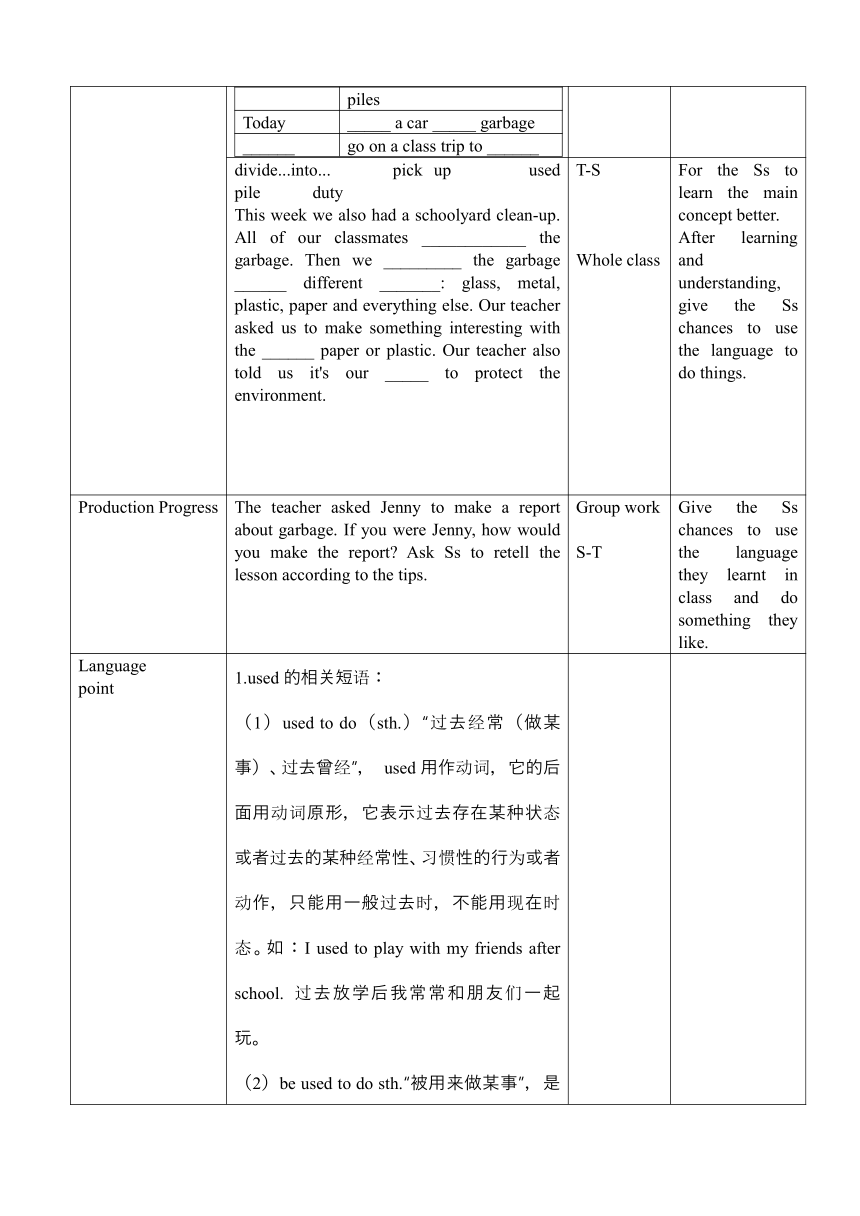冀教版八年级下Unit 8 Save Our World Lesson 48 Garbage Is Interesting!教案(表格式)
文档属性
| 名称 | 冀教版八年级下Unit 8 Save Our World Lesson 48 Garbage Is Interesting!教案(表格式) |

|
|
| 格式 | doc | ||
| 文件大小 | 53.0KB | ||
| 资源类型 | 教案 | ||
| 版本资源 | 冀教版 | ||
| 科目 | 英语 | ||
| 更新时间 | 2022-05-05 00:00:00 | ||
图片预览


文档简介
Lesson 48Garbage Is Interesting!
教学目标:
1. To learn some words and phrases to describe some interesting garbage such as divide...into..., make...out of..., sort, pile.
2. Learn how to talk about To talk about some interesting garbage in schoolyard.
3. Learn about World Envioronment Day.
4.Emotion To arise students’ awareness of sorting the garbage before throwing it away.
教学重点:
1. New words and phrasesVocabulary: sort, pile
Phrases: divide...into..., make...out of.....
2. Learn how to talk about some interesting garbage in schoolyard.
3.Learn about World Envioronment Day.
教学难点:To talk about how to sort the garbage
教学方法:Task based teaching ,learning in doing
教学辅助:Text book ,Multi-media
教学步骤设计:
Teaching procedure
Stage Procedure Interactionpattern Aims
Warming-up T: Look at the pictures. What are they made of They are made of some garbage. Garbage is very interesting and it can be made into many useful things. Do you want to know what they can be made into Today let’s learn about it in Lesson 48. T-SS-S Motivate the Ss and lead in the new concept.
Presentation andPractice Read and fill in the blanks.WhenWhatOn Tue.____ and picked up the garbage_______went for a walk and found a _____ toyOn Wed._____ the garbage and _____ the garbage ____ different pilesToday_____ a car _____ garbage______go on a class trip to ______ Whole classT-Sindividual work and pair work For the Ss to get some basic information about the topic.They are helpful for them to learn the main concept.
divide...into... pick up used pile duty This week we also had a schoolyard clean-up. All of our classmates ____________ the garbage. Then we _________ the garbage ______ different _______: glass, metal, plastic, paper and everything else. Our teacher asked us to make something interesting with the ______ paper or plastic. Our teacher also told us it's our _____ to protect the environment. T-SWhole class For the Ss to learn the main concept better.After learning and understanding, give the Ss chances to use the language to do things.
Production Progress The teacher asked Jenny to make a report about garbage. If you were Jenny, how would you make the report Ask Ss to retell the lesson according to the tips. Group workS-T Give the Ss chances to use the language they learnt in class and do something they like.
Language point 1.used的相关短语:(1)used to do(sth.)“过去经常(做某事)、过去曾经”, used用作动词,它的后面用动词原形,它表示过去存在某种状态或者过去的某种经常性、习惯性的行为或者动作,只能用一般过去时,不能用现在时态。如:I used to play with my friends after school. 过去放学后我常常和朋友们一起玩。(2)be used to do sth.“被用来做某事”,是动词短语use...to do的被动语态结构,used是动词的过去分词。如:Knives are used to cut things.小刀是用来切东西的。(3)be used to doing something “习惯于做某事”,used用作形容词,to的后面接动名词。如:My father is used to living in the village. 我爸爸习惯于住在小山村。2. divide v. 分开;分割divide指把整体分成若干部分,有“分配”和“分享”的含义,用作及物动词时,接名词或代词作宾语,常和介词搭配。divide… into… 意为“把……分成……”。We must divide the people into some groups.我们必须把这些人分成几个组。The teacher divided our class ___. into_________ four groups.3.again and again再三地;反复地again and again为副词短语,用来修饰动词或动词短语,表示行为、经历、活动等的多次出现。同义短语:time and time again。When we were very young, our teacher told us again and again to study hard. 小时候,老师反复告诉我们要努力学习。她再三地尝试, 直到最后她成功了。She tried ___________ until she finally succeeded. 4. start out启程;出发;开始做start out 是由动词start 和副词out 构成的动副短语,表示“启程;出发”时,相当于 start off。 表示“开始/着手做……”时,后接不定式短语。We started out at 8 a.m. and arrived at 7 p.m.我们早上8点出发,下午7点到达。start的相关短语:1)start back开始返回;退回,如:They started back immediately when they got the news.他们得到消息就立即返回去了。2)start for动身去,如:He started for his holiday with a light heart.他怀着轻松的心情动身去度假。3)start over重新开始,如:Let's start over and see if we can get it right this time.咱们从头再来一遍,看看这次是否能做对。4)start with从……开始,如:Which lesson shall we start with?我们从哪一课开始?
Expansion T: Do you want to know more about garbage Now let’s read a passage and answer the question."Hazardous" means dangerous. Some hazardous waste is poison--it makes people sick. Some products burn very easily. Hazardous things usually have these labels "poison", "caution", "warning" or "danger". What can we do about hazardous waste Which of these is hazardous Tick the correct ones.In fact, there are more and more waste in the world. How can we make use of it You have three tasks to choose. Whole class
ExercisesOn books ( )1. Can you help me to ____ the waste things A. Clean up B. Put up C. Make up D. Use up( )2. There is so much ___ .Can you pick it up and throw it to the dustbin A. pollution B.paper C.rubbish D.litters( )3. The book is on the ground.Would you ____ for me please A. Pick it up B.pick it up C. Pick it out D.pick out it( )4. There is ____milk in the bottle .We don’t need to buy any now. A. few B.little C. bit D.a bit of( )5. It ____us two hours to do this work yesterday. A. cost B.takes C. spent D.took
Homework 1. Do “Learn English”.2. Read the lesson for three times.3. Choose one of the tasks and write it down in your exercise book.
教学反思:虽然班级两极分化严重,但对于“环境保护”这个话题学生的学习兴趣十分高。对于口语和写作开展活动非常有益。
学生确确实实学习了,也做的非常好!
教学目标:
1. To learn some words and phrases to describe some interesting garbage such as divide...into..., make...out of..., sort, pile.
2. Learn how to talk about To talk about some interesting garbage in schoolyard.
3. Learn about World Envioronment Day.
4.Emotion To arise students’ awareness of sorting the garbage before throwing it away.
教学重点:
1. New words and phrasesVocabulary: sort, pile
Phrases: divide...into..., make...out of.....
2. Learn how to talk about some interesting garbage in schoolyard.
3.Learn about World Envioronment Day.
教学难点:To talk about how to sort the garbage
教学方法:Task based teaching ,learning in doing
教学辅助:Text book ,Multi-media
教学步骤设计:
Teaching procedure
Stage Procedure Interactionpattern Aims
Warming-up T: Look at the pictures. What are they made of They are made of some garbage. Garbage is very interesting and it can be made into many useful things. Do you want to know what they can be made into Today let’s learn about it in Lesson 48. T-SS-S Motivate the Ss and lead in the new concept.
Presentation andPractice Read and fill in the blanks.WhenWhatOn Tue.____ and picked up the garbage_______went for a walk and found a _____ toyOn Wed._____ the garbage and _____ the garbage ____ different pilesToday_____ a car _____ garbage______go on a class trip to ______ Whole classT-Sindividual work and pair work For the Ss to get some basic information about the topic.They are helpful for them to learn the main concept.
divide...into... pick up used pile duty This week we also had a schoolyard clean-up. All of our classmates ____________ the garbage. Then we _________ the garbage ______ different _______: glass, metal, plastic, paper and everything else. Our teacher asked us to make something interesting with the ______ paper or plastic. Our teacher also told us it's our _____ to protect the environment. T-SWhole class For the Ss to learn the main concept better.After learning and understanding, give the Ss chances to use the language to do things.
Production Progress The teacher asked Jenny to make a report about garbage. If you were Jenny, how would you make the report Ask Ss to retell the lesson according to the tips. Group workS-T Give the Ss chances to use the language they learnt in class and do something they like.
Language point 1.used的相关短语:(1)used to do(sth.)“过去经常(做某事)、过去曾经”, used用作动词,它的后面用动词原形,它表示过去存在某种状态或者过去的某种经常性、习惯性的行为或者动作,只能用一般过去时,不能用现在时态。如:I used to play with my friends after school. 过去放学后我常常和朋友们一起玩。(2)be used to do sth.“被用来做某事”,是动词短语use...to do的被动语态结构,used是动词的过去分词。如:Knives are used to cut things.小刀是用来切东西的。(3)be used to doing something “习惯于做某事”,used用作形容词,to的后面接动名词。如:My father is used to living in the village. 我爸爸习惯于住在小山村。2. divide v. 分开;分割divide指把整体分成若干部分,有“分配”和“分享”的含义,用作及物动词时,接名词或代词作宾语,常和介词搭配。divide… into… 意为“把……分成……”。We must divide the people into some groups.我们必须把这些人分成几个组。The teacher divided our class ___. into_________ four groups.3.again and again再三地;反复地again and again为副词短语,用来修饰动词或动词短语,表示行为、经历、活动等的多次出现。同义短语:time and time again。When we were very young, our teacher told us again and again to study hard. 小时候,老师反复告诉我们要努力学习。她再三地尝试, 直到最后她成功了。She tried ___________ until she finally succeeded. 4. start out启程;出发;开始做start out 是由动词start 和副词out 构成的动副短语,表示“启程;出发”时,相当于 start off。 表示“开始/着手做……”时,后接不定式短语。We started out at 8 a.m. and arrived at 7 p.m.我们早上8点出发,下午7点到达。start的相关短语:1)start back开始返回;退回,如:They started back immediately when they got the news.他们得到消息就立即返回去了。2)start for动身去,如:He started for his holiday with a light heart.他怀着轻松的心情动身去度假。3)start over重新开始,如:Let's start over and see if we can get it right this time.咱们从头再来一遍,看看这次是否能做对。4)start with从……开始,如:Which lesson shall we start with?我们从哪一课开始?
Expansion T: Do you want to know more about garbage Now let’s read a passage and answer the question."Hazardous" means dangerous. Some hazardous waste is poison--it makes people sick. Some products burn very easily. Hazardous things usually have these labels "poison", "caution", "warning" or "danger". What can we do about hazardous waste Which of these is hazardous Tick the correct ones.In fact, there are more and more waste in the world. How can we make use of it You have three tasks to choose. Whole class
ExercisesOn books ( )1. Can you help me to ____ the waste things A. Clean up B. Put up C. Make up D. Use up( )2. There is so much ___ .Can you pick it up and throw it to the dustbin A. pollution B.paper C.rubbish D.litters( )3. The book is on the ground.Would you ____ for me please A. Pick it up B.pick it up C. Pick it out D.pick out it( )4. There is ____milk in the bottle .We don’t need to buy any now. A. few B.little C. bit D.a bit of( )5. It ____us two hours to do this work yesterday. A. cost B.takes C. spent D.took
Homework 1. Do “Learn English”.2. Read the lesson for three times.3. Choose one of the tasks and write it down in your exercise book.
教学反思:虽然班级两极分化严重,但对于“环境保护”这个话题学生的学习兴趣十分高。对于口语和写作开展活动非常有益。
学生确确实实学习了,也做的非常好!
同课章节目录
- Unit 1 Spring Is Coming
- Lesson 1 How's the weather?
- Lesson 2 It's Getting Warmer!
- Lesson 3 Sun Is Rising
- Lesson 4 The Spring City
- Lesson 5 Babysitting on a Spring Day
- Lesson 6 Stories about Spring
- Unit 2 Plant a Plant
- Lesson 7 Planting Trees
- Lesson 8 Why Are Plants Important?
- Lesson 9 Gardening with Mary
- Lesson 10 Make Your Garden Grow!
- Lesson 11 Amazing Plants
- Lesson 12 Danny's Plant
- Unit 3 Animals Are Our Friends
- Lesson 13 Danny's Big Scare
- Lesson 14 Amazing Animals
- Lesson 15 The Zoo Is Open
- Lesson 16 The Pear Escaped
- Lesson 17 Save the Tigers
- Lesson 18 Friendship Between Animals
- Unit 4 The Internet Connects Us
- Lesson 19 How Do You Use the Internet?
- Lesson 20 A Computer Helps!
- Lesson 21 Books or Computers?
- Lesson 22 Travel on the Internet
- Lesson 23 The Internet--Good or Bad?
- Lesson 24 An E-mail to Grandpa
- Unit 5 Buying and Selling
- Lesson 25 Raising Money
- Lesson 26 Cookies, Please!
- Lesson 27 Business English
- Lesson 28 Ms. Liu's Great Idea
- Lesson 29 How to Push a Product
- Lesson 30 A Cookie Sale
- Unit 6 Be a Champion!
- Lesson 31 Don't Fall, Danny
- Lesson 32 My Favourite Record
- Lesson 33 2800 Years of Sports
- Lesson 34 Modern Olympics
- Lesson 35 The Dream Team
- Lesson 36 Classroom Olympics
- Unit 7 Know Our World
- Lesson 37 Let's Learn Geography!
- Lesson 38 The World Is a Big Place
- Lesson 39 Ring Up or Call?
- Lesson 40 Body Language
- Lesson 41 A Class of the World
- Lesson 42 North America
- Unit 8 Save Our World
- Lesson 43 Let's Clean Up!
- Lesson 44 Environment Clubs
- Lesson 45 Let's Sort Garbage!
- Lesson 46 Protect Our Environment
- Lesson 47 Connected to Nature
- Lesson 48 Garbage Is Interesting!
